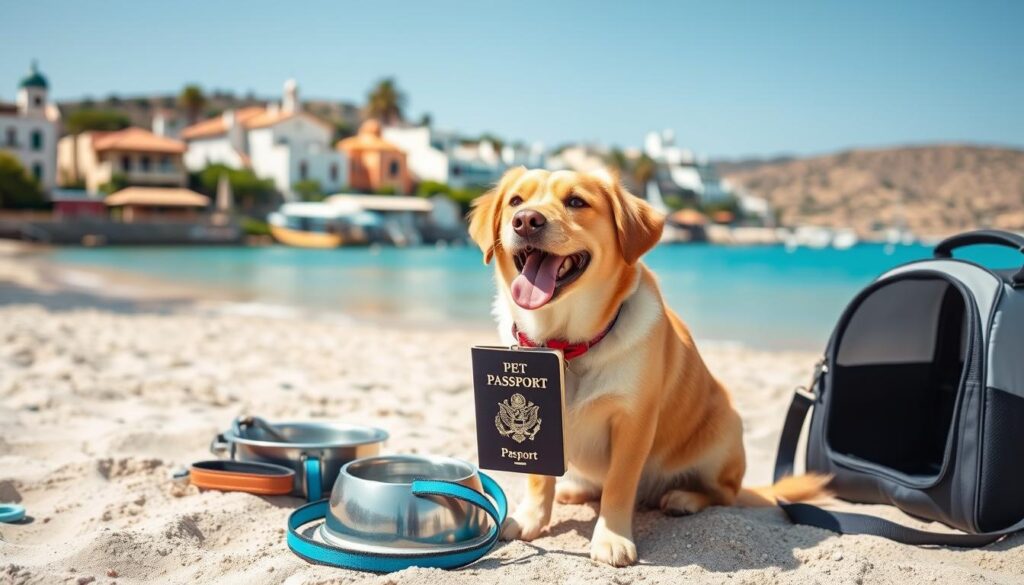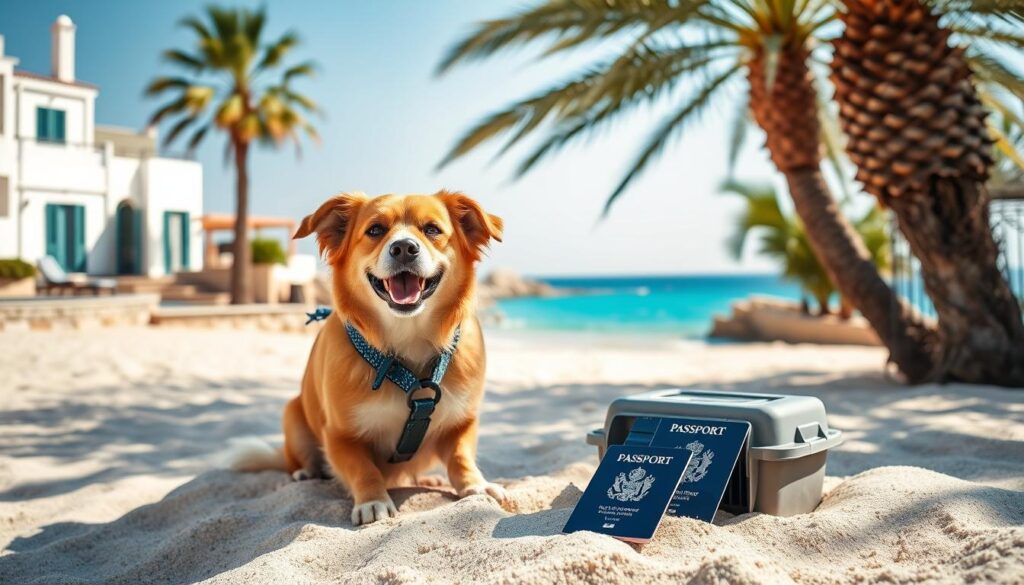Moving pets to Cyprus is a significant undertaking that requires careful planning and awareness of various regulations. This guide offers valuable insights into the pet travel requirements Cyprus mandates when bringing your dog along to this beautiful Mediterranean destination. Understanding the necessary documentation and preparation can ensure a smooth transition for both you and your furry friend.
As a pet owner, emigrating to Cyprus with a dog can be an enriching adventure, but it also comes with its unique set of challenges. The essential practices around microchipping, vaccinations, and health certifications will be explored, helping you navigate the intricacies of Cyprus dog import regulations. By adhering to these guidelines, you can avoid any complications related to quarantine or entry restrictions.
For comprehensive information on specific regulations, visit the official pet travel site. With diligent preparation, your move can be a joyous experience rather than a stressful one.
Key Takeaways
- Understand the importance of microchips and vaccinations when emigrating to Cyprus with a dog.
- Familiarize yourself with the pet travel requirements Cyprus outlines for dogs.
- Ensure you have the necessary health certificates to avoid complications at entry.
- Stay updated on the latest Cyprus dog import regulations to facilitate smooth travel.
- Plan well in advance to manage the logistics and comfort of your pet during the move.
Unlock Investment Opportunities Abroad!
Introduction to Moving Pet to Cyprus
Relocating with pets can present unique challenges, especially when considering pet immigration to Cyprus. Ensuring a smooth transition for your dog requires a clear understanding of the regulations set by Cypriot authorities. One essential detail is that pet owners are allowed to travel with a maximum of five pets, unless the journey is for specific purposes such as exhibitions, competitions, or sporting events1. Starting the process early can alleviate potential issues, as various entry points, including Larnaca and Paphos International Airports, have specific requirements that travelers must meet1.
Importantly, pet owners must notify the veterinary office at their chosen entry point no less than 48 hours before arrival. This notification should include the flight number or ship name1. To enter Cyprus, pets must possess a microchip that adheres to international standards and a valid rabies vaccination, effective after 21 days1. With these guidelines, moving pets to Cyprus becomes a manageable task.
Utilizing resources like the official pet travel guidelines can further assist in navigating the process effectively.
Pet Travel Requirements Cyprus
Complying with pet travel requirements Cyprus is essential for a smooth transition when bringing your dog to the island. Understanding the specific regulations will help ensure your pet’s safe entry into Cyprus.
Understanding Microchip Requirements
Before anything, it’s crucial to have your dog microchipped in accordance with the regulations. The microchip should conform to ISO 11784/11785 standards and must be implanted before any vaccinations are administered. This is a key step in the Cyprus dog import regulations.
Vaccination Protocols for Dogs
Dogs must undergo rabies vaccination after being microchipped. This vaccination must be current and must be administered 21 days before travel to comply with the relevant pet travel requirements Cyprus. In addition to rabies, other required vaccinations include Parvo, Distemper, Hepatitis, and Leptospira. In total, pet owners should ensure that their dogs meet specific vaccination timelines to avoid delays in entry2.
Health Certificates Needed for Entry
Obtaining a health certificate from a licensed veterinarian is mandatory. This certificate is particularly vital if traveling from outside the EU. Dogs must undergo a 48-hour health examination prior to export, and all necessary details, including vaccinations and microchip information, should be documented. Proper adherence to these health certification protocols will significantly facilitate your entry into Cyprus2.

| Requirements | Details |
|---|---|
| Microchip | ISO 11784/11785 standard required. |
| Rabies Vaccination | Must be administered after microchipping. |
| Health Certificate | Mandatory before entry, issued after a health examination. |
| Additional Vaccinations | Parvo, Distemper, Hepatitis, Leptospira. |
| Home Quarantine | Required for a minimum of six months. |
Understanding these requirements is vital, as failing to adhere to the listed Cyprus dog import regulations could result in unexpected challenges. It’s advisable for pet owners to stay informed and prepare all necessary documentation well in advance.
Cyprus Dog Import Regulations
Understanding Cyprus dog import regulations is crucial for a successful move with your furry friend. The regulations focus on various aspects of pet travel, ensuring the safety of both the pets and the residents. Adhering to these rules minimizes the risk of complications during the import process.
Overview of Rabies Vaccination Rules
In 2024, pets must undergo a rabies vaccination administered after microchipping and when they are at least 12 weeks old. This vaccination becomes effective in Cyprus no earlier than 21 days after administration, and subsequent boosters must be given before the expiry of the primary vaccine3. Alongside, it’s mandatory to notify the District Veterinary Office of the entry 48 hours before arrival. Owners must also ensure their pets are at least 111 days old upon entry4. Notably, some breeds are prohibited for import, including the Pit Bull Terrier and the Japanese Tosa.
Unlock Investment Opportunities Abroad!
Details on Rabies Titer Test
For dogs arriving from high-rabies countries, a rabies antibody titer test is essential. This test, required to be conducted at an EU and OIE approved laboratory, mandates that the antibody titer is equal to or exceeds 0.5 IU/ml3. The timing of the titer test is important; it should be done at least 30 days after vaccination, which aligns with the necessary waiting periods before travel4. To ensure smooth dog travel Cyprus, it is vital to gather all relevant documents and health certificates.

Steps for Emigrating to Cyprus with a Dog
When planning for pet relocation Cyprus, ensuring a smooth and stress-free experience starts with thorough preparation. Owners must take specific steps that include acclimating their dogs to travel conditions and gathering all necessary documents. A well-organized approach eases the entire transition for both pet and owner.
Preparing Your Dog for Travel
Before embarking on a journey, it is crucial to acclimate your dog to a travel crate. This can help reduce anxiety and make your dog feel more secure. Health records, including vaccination and health certificates, should be complete to avoid complications during entry into Cyprus. Having all documentation in order will help ensure compliance with local regulations, thus facilitating pet travel Cyprus seamlessly.
Booking Pet Transportation
It is advisable to book transportation for your dog well in advance to secure the best options available. Consider various pet transport services that specialize in international travel to ensure they are knowledgeable about the legal requirements specific to Cyprus. Selecting a reliable transportation service can significantly mitigate travel stress for your pet.
Choosing the Right Airline for Dog Travel
When choosing the right airline for dog travel, prioritize those with pet-friendly policies and practices that align with International Air Transport Association (IATA) regulations. Some airlines may have specific requirements that could affect your travel plans. It is essential to research and confirm that the chosen airline provides adequate accommodations for pets to enhance their travel experience.

For complete guidance on moving pets, including specific entry rules and health protocols, check out the comprehensive details on pet relocation to Cyprus. Understanding these steps significantly reduces the likelihood of complications during your move, paving the way for successful integration into your new home.
The journey of relocating with your dog to Cyprus requires diligence, attention to detail, and an understanding of local laws to ensure a happy travel experience for all involved567.
Pet Relocation Cyprus: Choosing a Service
Moving your furry friend to a new country can be a daunting task. Engaging a professional pet relocation service can significantly ease the challenges related to transporting expatriate pets Cyprus. These companies handle everything from paperwork to logistics, ensuring a seamless transition for you and your pet.
Benefits of Professional Pet Transport Services
Employing professional pet transport services offers multiple advantages, including:
- Stress Reduction: Relocation can be chaotic, and professionals manage the heavy lifting.
- Expert Guidance: Knowledgeable about pet travel regulations, ensuring compliance with Cyprus laws.
- Safety Assurance: Enhanced security measures and proper transport facilities ensure safe travels for your pet.
- Cost Efficiency: While costs can vary, relying on experienced services can sometimes help save on unexpected expenses and ensure peace of mind.
What to Look for in a Pet Relocation Company
Choosing the right pet relocation company involves careful consideration. Here is what you should focus on:
- Experience: Look for companies with a proven track record and years of experience in pet shipping, as many have been in the business for up to 35 years8.
- Comprehensive Services: Ensure they offer all necessary services such as flight reservations, customs clearing, and updates during the journey8.
- Membership: Verify if the company is a member of recognized transport associations like IPATA.
- Reputation: Assess reviews and testimonials to gauge customer satisfaction and service reliability.

Living in Cyprus with Pets
Once you’ve settled in Cyprus, you’ll discover it is a remarkable place for living in Cyprus with pets. The island’s warm climate encourages an active lifestyle, allowing for long walks along beaches and excursions through nature that your furry friends will love. The local community has a generally pet-friendly attitude, and you’ll find various outdoor areas, although dog parks might not be as common as in other countries. Many popular beaches also welcome dogs, creating a fantastic environment for pet owners to spend quality time with their companions.
Understanding the Pet-Friendly Environment
For expat pets Cyprus, understanding the local environment is crucial. While some dogs thrive in the heat, given the right conditions, certain breeds may require you to provide additional care. For instance, when relocating to a warmer climate like Cyprus, it’s advisable to gradually acclimatize your dog during late autumn to ease the transition to the heat9. Additionally, many owners have reported that their pets adjust well, with one participant sharing their experience of bringing an older dog from the UK who adapted beautifully to the new climate9. Providing adequate shelter and water is essential for your pet’s health and comfort, especially on those hot summer days.
Finding Pet-Friendly Accommodations
Finding pet-friendly accommodations in Cyprus can vary, so it’s wise to research properties that explicitly welcome dogs. Real estate listings often specify pet policies, and you may need to look beyond the typical rental chains to find homeowners willing to accept expat pets Cyprus. Connecting with local pet owner networks can also be valuable, as they can share recommendations for places to live that provide not just space but also a supportive environment for your furry friends. Moreover, local veterinary clinics are widely available, ensuring your pet receives care whenever necessary10.
In summary, living in Cyprus with pets comes with many advantages, from the welcoming community to the abundance of outdoor activities. By understanding both the landscape and pet policies, you can ensure a fulfilling life for both you and your beloved dogs in this beautiful Mediterranean paradise.
Unlock Investment Opportunities Abroad!
FAQ
What are the pet travel requirements for Cyprus?
To bring your dog to Cyprus, you’ll need to ensure they are microchipped, vaccinated against rabies, and have a health certificate issued by a licensed veterinarian. All vaccinations should be up to date, and in some cases, a rabies titer test may be required.
How can I prepare my dog for the journey to Cyprus?
Preparing your dog involves acclimating them to a travel crate, ensuring their health and vaccination records are complete, and booking transportation well in advance. It’s also advisable to choose a pet-friendly airline.
What documentation is required for moving pets to Cyprus?
You’ll need a microchip identification, a current rabies vaccination certificate, a health certificate from a licensed vet, and potentially a rabies titer test result, especially if coming from a high-rabies country.
Are there specific import regulations for dogs entering Cyprus?
Yes, dogs must be vaccinated against rabies, and this vaccination must occur after microchipping. Additional regulations apply if coming from high-rabies regions, like the requirement for a rabies titer test.
How do pet relocation services assist in relocating dogs to Cyprus?
Professional pet relocation services provide comprehensive support, including managing health certifications, transportation bookings, and ensuring compliance with international pet travel regulations. This reduces stress for both you and your dog.
What is the pet-friendly environment like in Cyprus?
Cyprus boasts a generally welcoming atmosphere for pets, with numerous parks and beaches for outdoor activities. However, finding pet-friendly accommodations can vary, so it’s advisable to research options before your move.
Can I take my dog to restaurants or cafes in Cyprus?
Many places in Cyprus are pet-friendly, allowing dogs in outdoor seating areas. However, policies may vary by establishment, so it’s best to check in advance.
What should I do if my dog requires medical attention in Cyprus?
There are veterinary services readily available in Cyprus. It’s a good idea to research local veterinarians before your move and keep emergency contact information handy.
Are there any breed restrictions for dogs in Cyprus?
Certain breeds may be restricted or regulated in Cyprus. It’s important to check with local authorities or your relocation service to ensure compliance with designated breed regulations.
Source Links
- https://www.cucarecu.uk/intarnational-travel-pets/cyprus
- https://www.infonorthcyprus.com/importing-pets
- https://cyprus-real.estate/faq/rules-for-importing-animals-into-cyprus-in-2024/
- http://www.mfa.gov.cy/mfa/highcom/highcom_pretoria.nsf/All/4CC53428BF6371E3C2257A0E0050C1BD
- https://www.gov.uk/bring-pet-to-great-britain
- https://visaguide.world/moving-to/cyprus/
- https://www.moa.gov.cy/moa/vs/vs.nsf/vs07_en/vs07_en?OpenDocument
- https://forwardersearch.lufthansa-cargo.com/en/Pet-Transport/
- https://www.expatforum.com/threads/moving-to-cyprus-need-advise-on-my-dogs.827650/
- https://www.expatexchange.com/ctryguide/25411/35/Cyprus/Moving-to-Cyprus-Moving-with-a-Pet-to-Cyprus

Comments